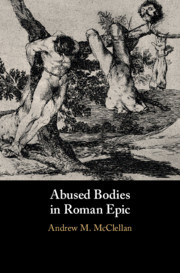Description
Abused Bodies in Roman Epic
Author: McClellan Andrew M.
The first full study of corpse mistreatment and funeral violation in Greco-Roman epic poetry, illuminating many major texts.
Language: English
Subject for Abused Bodies in Roman Epic:
Approximative price 107.80 €
In Print (Delivery period: 14 days).
Add to cart
Publication date: 07-2019
318 p. · 15.7x23.5 cm · Hardback
318 p. · 15.7x23.5 cm · Hardback
Description
/li>Contents
/li>Biography
/li>
Greco-Roman martial epic poetry, from Homer and Virgil to Neronian and Flavian epic, is obsessed with the treatment of dead bodies. Sometimes corpses take centre-stage in grand funerals; sometimes, disturbingly, they are objects of physical violence or malign neglect. In this book - the first full-length examination of corpse mistreatment in epic - Andrew M. McClellan explores the motif of post mortem abuse in Greco-Roman epic, especially the Latin poems of early imperial Rome: Lucan's Bellum ciuile, Valerius Flaccus' Argonautica, Statius' Thebaid, and Silius' Punica. He counters the pervasive tendency to view epic violence from the perspective of the abuser by shifting the focus to the object of abuse. In signalling the corpse as a critical 'character' and not simply a by-product of war, he offers a fundamental re-evaluation of violence and warfare in Latin epic, and through close study of intertextualities indicates the distinctive features of each author's treatment of the dead.
Preface; Notes on texts and abbreviations; Introduction; 1. Setting the stage: corpse abuse in Homer and Virgil; 2. Decapitation in Lucan, Statius, and Silius Italicus; 3. Unburied past: Lucan's Bellum ciuile; 4. Argonautic abuses: Valerius Flaccus' (and Apollonius') Argonautica; 5. Funeral 'rights': Statius' Thebaid; 6. Grave encounters: Silius Italicus' Punica; Epilogue: a post mortem; Bibliography; Index locorum; General index.
Andrew M. McClellan is the Stepsay Family Postdoctoral Fellow in Classics at San Diego State University. His research interests range widely across Greek and Latin literature, especially epic poetry, drama, historiography, and classical reception. He is particularly interested in the intersections of war, violence, and death in Roman epic poetry and society.
© 2024 LAVOISIER S.A.S.




